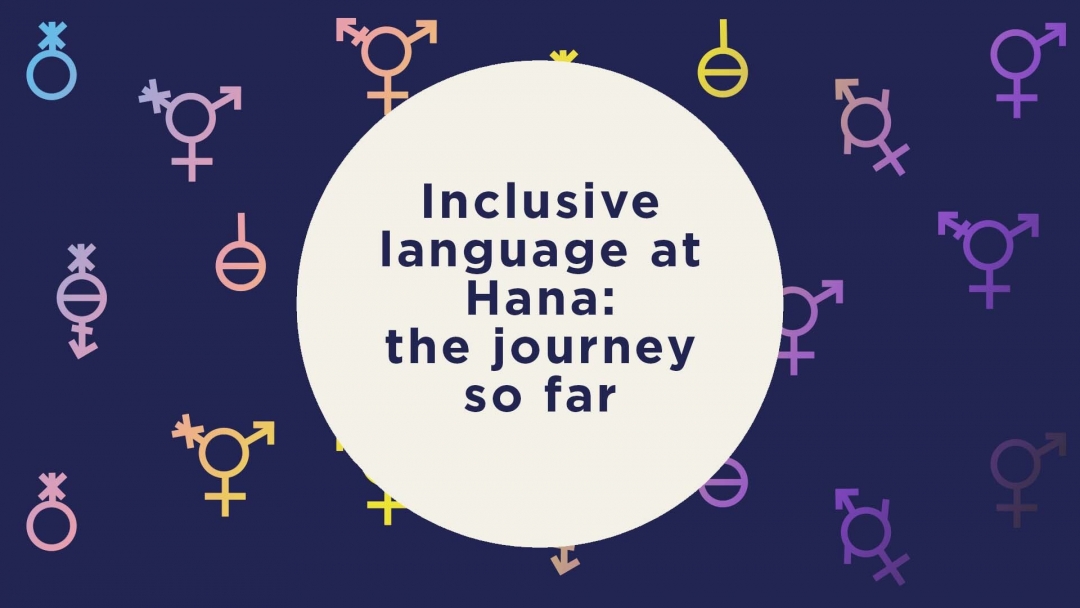At Hana, we know that people’s gender identity is as diverse and unique as the person themselves. While the majority of people who use Hana are women, some trans men, non binary and people of other gender identities may also choose to use Hana as their contraceptive pill.
It’s really important to us that we are not excluding anyone from the conversation: if you have the capacity to get pregnant and you don’t want to have a baby right now, you should know what your options are.
Contraception options for trans men and non binary folk
Kirrin Medcalf, Head of Trans Inclusion, Stonewall said: ‘It’s vital that any cis woman, trans man and non-binary person who needs the pill can access it. This is a matter of reproductive equality.
Anyone who has periods or the ability to become pregnant has the right to control when and whether they become pregnant. But many trans men and non-binary people have struggled to access the pill as some providers are unsure whether they can give it to trans patients.’
According to the The Faculty of Sexual and Reproductive Healthcare (FSRH), there is no restriction on the use of any method of contraception for people assigned female at birth on account of their current gender identity.
Whether or not someone chooses to take hormones or have surgery is a personal decision, and so there is no one size fits all advice on taking contraception as a trans man or non binary person. You should keep in mind that testosterone treatment is not a contraceptive, so you could still get pregnant if you are taking testosterone and have unprotected sex.
Progestogen-only contraceptive methods are not thought to interfere with testosterone treatment , according to the FSRH. Contraceptives which contain oestrogen are not recommended, as they will counteract the testosterone.
Please speak to your doctor or pharmacist about your contraceptive options and remember to be clear on any medications you are taking so they can help you make an informed decision.
Access and education is really important to us, so we want to make sure that you know what your contraceptive options are so you can make an informed choice. We know it can be difficult to navigate contraception, so we hope that the information we provide can help make things clearer.
We’ll be honest: we don’t always get our language right and we are constantly learning. We’ve been on a journey with the language we use at Hana and it’s far from done, because language and terminology is constantly evolving. To explain what we mean, let us take you on a journey.

The trouble with using the word ‘people’ in a medical setting
When we first started thinking about Hana’s communication, we suggested using the word ‘people’ to avoid excluding anyone. This wasn’t possible, however, because Hana is medically licensed for ‘women of childbearing age’ and is not suitable for cisgender men, trans women or people who can’t take Hana for health related reasons.
As a medical brand, all of our communications are reviewed by an external body and it will not be approved if there is anything that could potentially be misleading or inappropriate.
Using the word ‘people’ would be medically incorrect as Hana cannot be used by all people. We also don’t want to ignore the fact that the majority of people who use Hana identify as female. We don’t want to make anyone feel excluded – our focus is always on inclusion.
Before purchasing Hana, you will have a consultation with a pharmacist to determine if this progestogen-only pill is right for you. Hana is generally well tolerated, but it’s not suitable for everyone.
Womxn: inclusive or exclusive?
We then considered using the word ‘womxn’ on our channels.. The word ‘womxn’ challenges patriarchal language by removing the word ‘men’ from ‘women’, but it does not seem that the majority of people appreciate being referred to in this way.
Womxn is also used to include diverse gender identities, but we are aware that in reality this doesn’t always work. Trans men and non binary people do not wish to be referred to as women, whereas some cis women feel that ‘womxn’ is insulting and patronising.
Alice Pelton, founder of The Lowdown, says: “ We don’t use womxn because we understand this to be associated with TERF’ism and potentially causes more harm to some than good!”
At our core, is the belief that contraception should be easier to access, and should empower those that use it.
Why we say ‘women and people with uteruses’
We are currently using ‘women and people with uteruses’ to describe the people that Hana is suitable for, but we know it isn’t perfect either. We spoke to Jake Edwards, social media lead at Mermaids, about this term.
“I don’t personally have any strong thoughts against it, but there will be people within the trans community who feel uncomfortable with that term. Especially if they’re trans men or non binary, they might feel it aligns them with women in a way that makes them feel uncomfortable,” they say.
Other options
We are looking to continuously update our language to ensure as many as possible feel comfortable with it. Jake suggested ‘people who can get pregnant’ as an alternative.
Some people say that ‘AFAB’ (assigned female at birth) is the best term to use because it focuses on biological sex rather than gender identity. This term can be used to describe the biology of a transgender, non-binary, or intersex person.
While this term can be helpful when talking about the medical side of things, many people do not like being referred to as ‘AFAB’ or being asked if they are ‘AFAB’. Calling a transman ‘AFAB’ would erase his identity as a man and put him in a female sphere against his will.
This is an on-going conversation
It is not our intention to make cisgender women and girls feel like they are being excluded from using Hana. Far from it. We acknowledge that the majority of people who use Hana identify as women and we would never want to alienate them from a product designed to help them avoid unplanned pregnancy. It is, however, really important that trans and non binary people know what their contraception options are.
We do not wish to exclude women from Hana, but rather include trans men, non binary people and anyone with a uterus who does not identify as female so they also have the information they need to make an informed decision about their contraception. It is our belief that inclusion doesn’t equal exclusion: it just creates a better, more informed situation for more people.
At our core, is the belief that contraception should be easier to access, and should empower those that use it. This is why this is so important to us, and that anyone who might choose the pill feels supported.
We are still learning and working on educating ourselves, and we know we don’t always get it right. We also work in a highly regulated environment which still favours binary language. There will be bumps in the road as we work towards creating an inclusive brand that is fit for the 21st century; that means we will constantly look to update what we are saying and why we are saying it.


